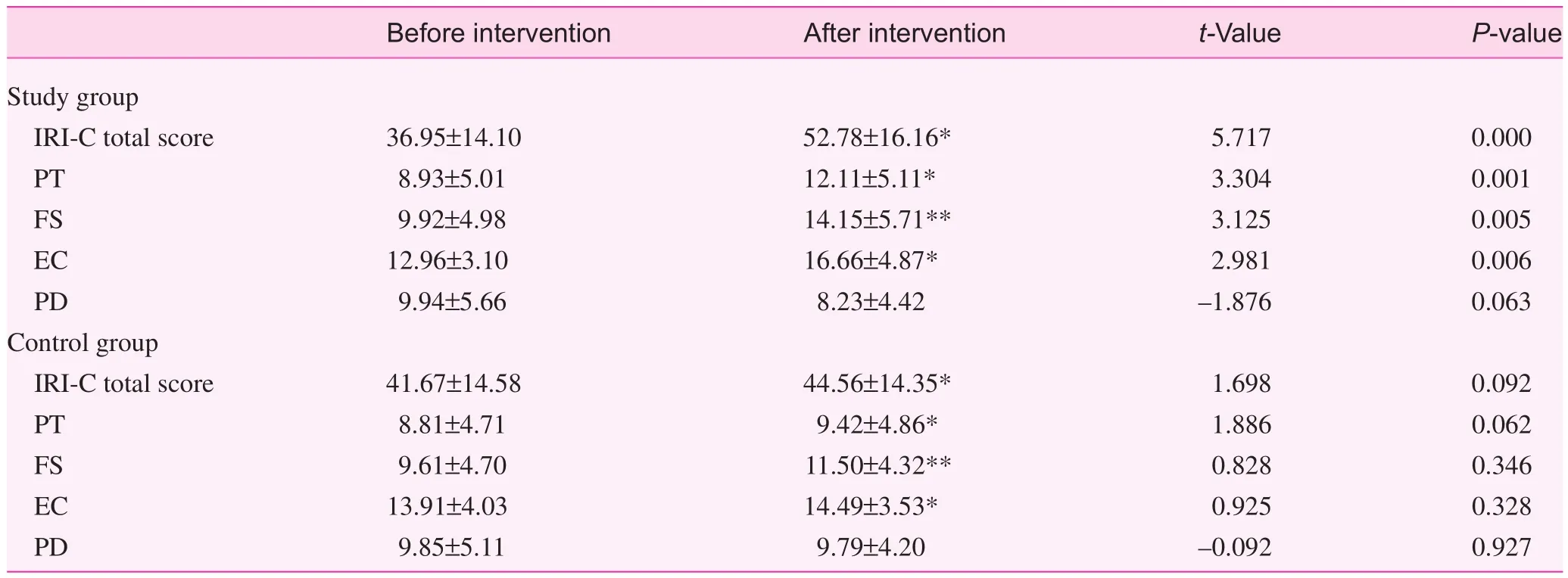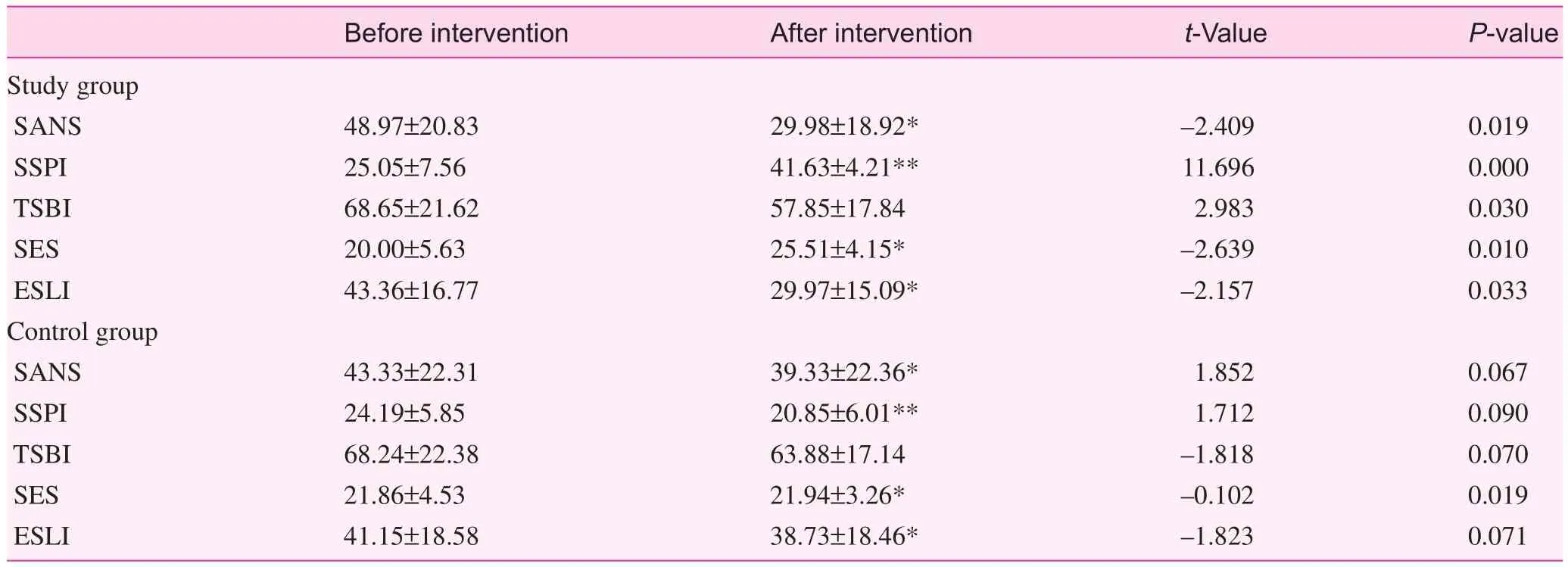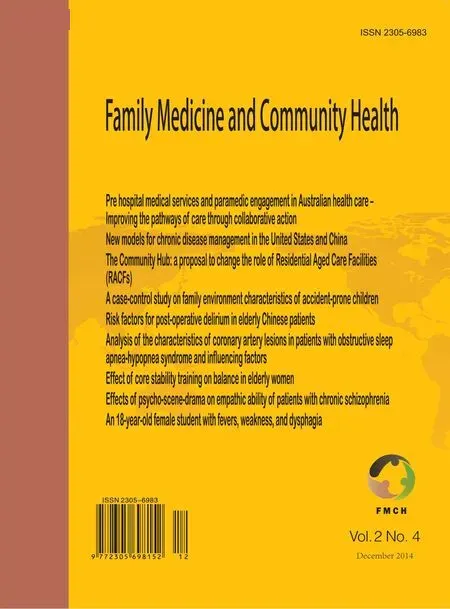Effects of psycho-scene-drama on empathic ability of patients with chronic schizophrenia
Hongmei Tian, Weifang Niu, Ping Liu, Na Wang, Huijing Yu, Zhanhong Zhao
Effects of psycho-scene-drama on empathic ability of patients with chronic schizophrenia
Hongmei Tian, Weifang Niu, Ping Liu, Na Wang, Huijing Yu, Zhanhong Zhao
Objective:The purpose of the current study was to determine the effects of psycho-scene drama on the empathic ability of patients with chronic schizophrenia.
Methods:One hundred sixteen in-patients with chronic schizophrenia were randomly divided into study and control groups (n=58 cases each). The original anti-psychotic drugs were not changed in either group. In the study group, the therapy was combined with psychological scene drama with a treatment course of 3 months. Before and after treatment, the interpersonal reaction index scale (Chinese version [IRI-C]), negative syndrome scale (SANS), social function assessment scale for patients with mental diseases (SSPI), Rosenberg self-esteem scale (SES), the emotional-social loneliness inventory (ESLI), and the Texas social behavior inventory (TSBI) were utilized for measurements.
Results:A comparison of the IRI-C total, PT, FS, and EC factor scores before and after treatment in the study group was signif cantly different (P<0.01); the PD factor score before and after treatment was not statistically signif cant (P>0.05). A comparison of the IRI-C total score and each factor score before and after treatment in the control group was not signif cantly different (P>0.05). A comparison of the IRI-C total, PT, and EC factor scores between the study and control groups after treatment was signif cantly different (P<0.05). A comparison of the FS factor score between the study and control groups before and after treatment was signif cantly different (P<0.01); the PD factor score was not signif cantly different (P>0.05). A comparison of the SANS total, SSPI total, SES total, and ESLI total scores between the two groups after treatment was signif cantly different (P<0.05).
Conclusion:The psycho-scene drama can improve the empathic ability of patients with chronic schizophrenia, improve the negative symptoms and social function, increase the selfesteem and self-conf dence, and reduce the loneliness in social interactions.
Psycho-scene-drama, Schizophrenia, Empathic ability
Introduction
Schizophrenia is a key psychiatric disease with a high disability rate and a poor longterm prognosis that results in a severe decline in social function, and a diff cult recovery. To explore effective rehabilitation methods is a long-term pursuit of the majority of mental health workers. Bora et al. [1] suggested that schizophrenic patients have empathy disorders, which might affect their interpersonal and social functions [2]. It follows, then, that improving the empathic ability of schizophrenic patients can effectively improve their interpersonal communication and socialfunction. Psycho-scene drama (PSD) adopts the similar scenes of life and utilizes the methods and skills of the action expression to reproduce the psychological activities and conf icts of life situations by way of stage performance to promote awareness and comprehension, emotional expression, and behavioral change in participants [3]. Scene-drama has been applied in campus education, and the effects on empathic ability of patients with schizophrenia have not been reported domestically. With this in mind, we conducted the current study.
Subjects and methods
Subjects
The study subjects included in the groups were male schizophrenic patients hospitalized in our hospital between March 2013 and December 2013, and the inclusion criteria were as follows: (1) 18–65 years of age; (2) an educational background above primary school, with normal speech function, a capability to communicate normally, and an ability to understand the scale content; (3) ICD-10 diagnostic criteria for schizophrenia; (4) a hospital stay >6 months, with relief or resolution of positive symptoms, and scores of each item on the SAPS scale <2 points or the total score ≤6 points; and (4) stable conditions for>3 months who were willing to cooperate, could complete the treatment, and signed the informed consent. Other diagnoses in conformity with the criteria other than the ICD-10 diagnostic criteria for schizophrenia and patients with serious physical illnesses and uncooperative patients were excluded. A random digits table was applied to divide the subjects into the study group and the control group of 58 cases each.
Methods
Data collection methods:Two psychiatrists registered the general demographic data and evaluated the psychiatric symptoms using the positive and negative symptom disease rating scales. Then, two psychotherapists investigated the empathy, self-esteem, and social behaviors of the patients in both groups before and after treatment. The evaluators were not involved in the treatment. After training, the rating scale evaluators reached an internal consistency of >0.85.
Intervention methods:The therapeutists in the Department of Rehabilitation with two assistant therapists were divided into three groups for treatment, with 20 patients in each. From the beginning, the patients were treated for 2 h twice a week; 1 month later, the frequency was changed to once a week for 3 months. First, patient interests and hobbies were evaluated. The specif c steps were divided into three phases: (1) In the beginning phase, the treatment focused on the pre-designed scene-drama performances to reproduce the common issues in daily life and social interaction of the patients, enhance understanding and trust among the group members, train the performance skills, give positive stimulation, such as encouragement to patients, and improve patient enthusiasm in participating in group activities. The skills of self-expression, substitute, role reversal, and mirroring could be applied. (2) In the principal operational phase, the treatment focused on the spontaneous scene-drama, namely real-time creation and performance phase, to encourage the patients to express themselves, guide patients to understand others, and improve the interpersonal capabilities. The skills of role-playing, and monologues and dialogues could be applied. (3) In the end phase, the treatment still focused on the spontaneous performance to encourage patients to participate in screenwriting and performance together and imagine the future scenes. Drawstring, sculpture techniques, and emotion traff c lights could be applied. For specif c therapeutic procedures, every treatment plan was made by the therapists who participated in the treatment from the beginning to guide patients to have a normal emotional communication, mobilize the initiative of the patients, such as using words and eye expression, to coordinate performance, and let the patients feel normal behavioral patterns during the imitation. For example, the patients were asked to begin the treatment by talking about their experiences, and gradually shift to talking about the problems and confusion encountered during their growth, then make plans for future life and interpersonal interaction. The therapies should clear the patients’ hearts, dredge the mental obstruction, and inform the patients that there is not only one way, but more than one way to solve problems. We can also write about the fragments about hospital life as well as problems and confusions encountered in job hunting and family life.
Evaluation tools
The interpersonal reaction index (IRI-C) was used to evaluate empathic ability before and after the intervention, theemotional-social loneliness inventory (ESLI) and Texas social behavior inventory (TSBI) were used to evaluate social loneliness and social behaviors, and the Rosenberg self-esteem scale (SES) was used to evaluate the level of self-esteem.
Interpersonal reactivity index [4] (Chinese Edition; IRI-C):With a total of 22 entries, the empathic ability of the patients was evaluated and f ve scoring levels of 0–4 were utilized. The higher the score was, the better the empathic ability was. IRI-C included the following four factors: perspective taking (PT); fantasy force (FS); empathic concern (EC); and personal distress (PD).
Emotional-social loneliness inventory (ESLI) [5]:The ESLI contained four sub-inventories (emotional isolation, social isolation, emotional loneliness, and social loneliness); four scoring levels (1–4) were used for each sub-inventory.
Texas social behavior inventory (TSBI) [5]:The TSBI was mainly used to evaluate the individual’s sense of selfworth or social interaction skills. The subjects answered questions at f ve scoring levels. The total score ranged from 0–64 points; the high points indicated high self-esteem.
Rosenberg self-esteem scale (SES) [5]:The SES scale was used to evaluate the overall feelings of self-worth and selfacceptance. The SES consisted of 10 entries with 4 scoring levels (1–4); the total score was 10–40 points. The higher score the score, the higher the degree of self-esteem.
Statistical methods
SPSS11.5 statistical software was used to input data and build databases and thet-test was carried out. The measurement data were represented as x±s, and aP<0.05 indicated the presence of statistical signif cance.
Results
Comparison of the IRI-C total and factor scores of the two groups before and after the psycho-scene drama intervention
After the intervention, the IRI-C total, PT, FS, and EC factor scores of the two groups increased; a comparison between the two groups with respect to the total, PT, and EC factor scores were signif cantly different (P<0.05). A comparison between the two groups with respect to the FS factor score indicated aP<0.01. The PD factor scores decreased, and there was no difference between the two groups (P>0.05; Table 1).

Table 1. Comparison of total and factor scores between the intervention and control groups of IRI-C before and after intervention
Comparison of SANS, SSPI, TSBI, SES, and ESLI of the two groups before and after intervention
A comparison of SANS, SSPI, TSBI, SES, and ESLI scores in the study group before and after the intervention was statistically signif cant (P<0.05). A comparison of SSPI and SES total scores was statistically signif cant (P<0.01). A comparison of the total score of all scales in the control group before and after intervention was not statistically signif cant (P>0.05). Comparisons of the SANS, SSPI, SES, and ESLI total scores between the study and control groups after the intervention were signif cant (P<0.05). Comparison of the TSBI score was not signif cant (P>0.05; Table 2).
Conclusion
With the effect of the disease, the psychological and social functions of patients with schizophrenia are inf uenced to varying degrees. With the progression of the conditions, most of the patients will enter into the chronic phase, abepithymia will occur, activities will decrease, the loss of reaction to things will occur, patients lack initiative, patients f nd it diff cult to get along with people and are unable to adapt to the social environment, the quality of life is thus affected, and burden is brought to family and society. Empathy is an individual’s understanding and response to the emotional experience of others and the interactions between people. Empathy plays a key role in interpersonal communication and social interaction, and empathy defects can affect interpersonal communication and social functions.
Learning theory suggests that all maladaptive behaviors and psychological disorders are acquired, and of course can be eliminated by re-learning [6]. According to this theory, the application of psycho-scene drama as an adjuvant treatment can improve the patient’s mental state and behaviors. Psychoscene drama is a way to practice how to live a life without being punished because of mistakes [3], which is based on the methods of forming groups to deal with problems. It can help the performers resolve emotional conf icts to explore their potential. Through the show of “internalization of action,” the participants can be enabled to relive the experience of many personal things at the inner levels and learn the skills of interpersonal relationships and obtain the inspiration of dealing with problems. This study showed that after treatment of psychological scene drama, the IRI-C total score and PT, FS, and EC factor scores of the two groups increased and the comparison of the total score and PT and EC scores of the two groups were statistically signif cant (P<0.05), which indicated thatthe empathic ability of the patients in the two groups increased after treatment, but the increase was signif cantly obvious in the study group and the comparison before and after the treatment were statistically signif cant (P<0.01). The PT factor was used to measure the cognitive components of empathy and EC was used to measure the emotional components of empathy, which indicated that after psycho-scene drama training, patients made great progress in the identif cation of others’emotions of themselves and others as well as the understanding and caring about others. The FS factor score increased after treatment; the comparison showed statistical signif cance before and after treatment (P<0.01), which showed that after training the patients could deeply understand the character’s emotions and behaviors through life events and works. The PD factor did not change before and after training (P>0.05), indicating that patients could not distinguish the pain between their own and others and often regard the sufferings of others as their own, and a study has shown that the patients with schizophrenia have a higher personal pain score than normal controls [7].

Table 2. Comparison of the total score between the intervention and control groups of SANS, SSPI, TSBI, SES, and ESLI before and after intervention
Negative symptoms can signif cantly affect a patient’s empathic ability [8]. This study showed that the negative symptoms signif cantly improved after training (P<0.05). The social functions of patients in the study group signif cantly improved when compared with before training and with the control group (P<0.01), which was consistent with the study of Lihong et al. [9]. Psycho-scene drama, by the simulation of the social life scenarios and the utilization of the form of performance, relieves the patients of tension with the effect of purif cation so that their repressed emotions can be expressed to convert internal mentality to the external behaviors through specif c actions. Comparison in terms of the esteem level and social loneliness between the study group and those before training and those of the control group were statistically signif cant (P<0.05). The patients improved their self-esteem level through psycho-scene drama training and reduced the social interaction loneliness. Psycho-scene drama deals with problems in the form of groups and can make people see that the problem they have is not unique and a common disease causes the same problem that they encounter. Thus, their conf dence of facing and solving the problems is increased. This is consistent with the study results of Yuping [10].
Schizophrenia is a severe mental illness that displays a chronic tendency and impairs social function. The rehabilitation of higher cognitive functions, especially the rehabilitation of empathic function, is an important part of the rehabilitative management of the social function. After a 3-month treatment, the behavioral patterns, ways of thinking, communication skills, and self-abasement of patients of group members improved somewhat. Through role-playing, a sincere relationship is cultivated between people, which make the patient have a sensation of freedom. He feels that he, like normal people, needs to express their feelings and interact with other people. He does not feel that he is forced to play a role, but plays an active role that helps himself and builds a mutual cooperation through an interdependent way to treat others and develop a capability for people to solve problems through communication. It is also a full ref ection of using psycho-scene drama in treatment.
The people’s unconscious behavior patterns are often formed automatically, most of which cannot be changed thoroughly during a short period of time. Even if patients are inspired during group treatment, the interpersonal communication skills are improved somewhat, and the emotions and behaviors are improved. Whether or not the improvements can be maintained after treatment needs further follow-up studies.
Conf ict of interest
The authors declare no conf ict of interest.
1. Bora E, Gokcen S, Veznedaroglu B. Empathic abilities in people with schizophrenia. Psych Res 2008;160:23–9.
2. Cheng G, Dong Y, Wang K, Zhu CY, Li WF, Geng F, et al. The empathic ability and social function of schizophrenia patients. J Clin Psych 2010;20:145–8.
3. Shi H. Psychodrama and psycho-scene-drama. Beijing: Beijing Normal University Press; 2006. pp. 135.
4. Davis MH. Empathy: a social psychological approach. Boulder, CO: Boulder Westview Press; 1996. pp. 62–81.
5. Wang XD, Wang XL, Ma H. Mental health scale assessment manual (Revised Edition). Beijing: Chinese Mental Health Journal; 1999. pp. 301–24.
6. Xu YX, Lv QY. Modern psychotherapy manual. Beijing: Peking Union Medical College Press, First Edition; 1997. pp. 99.
7. Montg C, Heinz A, Kunz D, Gallinat J. Self-reported empathic abilities in schizophrenia. Schizoph Res 2007; 92:85–9.
8. Zhang FF, Wang K, Dong Y, Bi QQ, Zhang ZJ, Du Y, et al. Empathy defects of schizophrenia and its inf uencing factors. Chin J Nerv Ment Dis 2010;(5):268–71.
9. Hu LH, Li J, Shi DJ, Yao Y, Yang WZ, Wang M. The role of psychodrama treatment on the social function of patients with schizophrenia. J Qilu Nurs 2010;16:14–6.
10. Zhou YP, Tang WZ. Control study on the psychodrama therapy in improving the self-esteem levels of schizophrenia patients. Chin Ment Health J 2002;16:669–71.
Rongjun Hospital of Hebei Province, Baoding 071000, Hebei, China
Hongmei Tian
No. 2396, Lianchinan Street, Baoding 071000, Hebei, China
E-mail:dongtiandemei2001 @163.com
20 September 2014;
Accepted 13 November 2014
 Family Medicine and Community Health2014年4期
Family Medicine and Community Health2014年4期
- Family Medicine and Community Health的其它文章
- The Community Hub: a proposal to change the role of Residential Aged Care Facilities (RACFs)
- A case-control study on family environment characteristics of accident-prone children
- Risk factors for post-operative delirium in elderly Chinese patients
- Analysis of the characteristics of coronary artery lesions in patients with obstructive sleep apnea-hypopnea syndrome and inf uencing factors
- Effect of core stability training on balance in elderly women
- Pre hospital medical services and paramedic engagement in Australian health care – Improving the pathways of care through collaborative action
